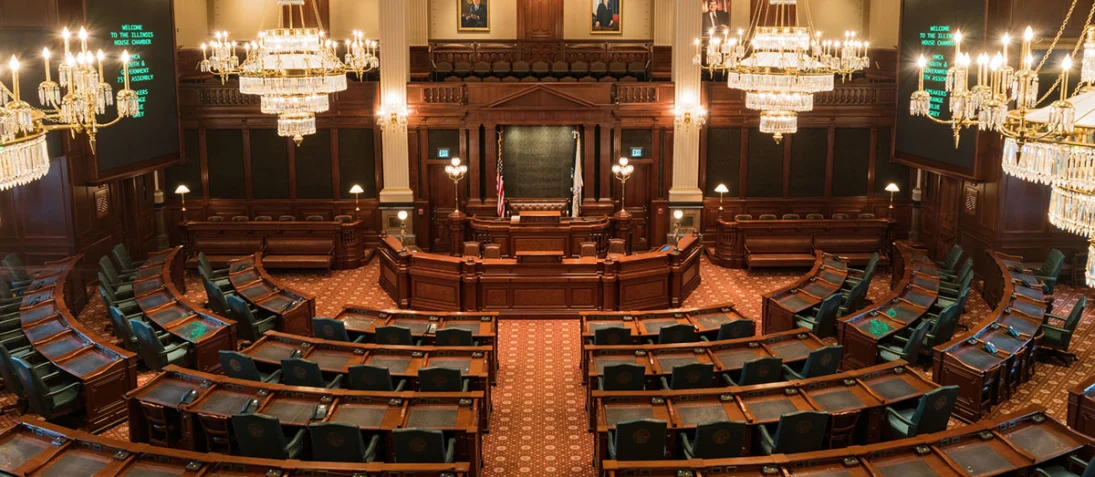
June 13, 2025
Illinois’ 2026 budget was a crucial test of the state’s willingness to fight the ongoing federal attacks on our social safety net and the basic rights of our residents. The stakes couldn’t be higher. To fund a massive tax cut for billionaires and corporations, Republicans in Congress have proposed a bill that would gut Medicaid, a program that provides essential health and elder care to 71 million Americans. Republicans hope to pass the so-called “One Big Beautiful Bill Act” — which would also slash billions in essential food assistance programs — by the July 4 holiday. If they succeed, the budget is sure to make Americans sicker and increase rates of child hunger. This fall, the country could see federal cuts to other programs, including housing and homeless assistance.
Unfortunately, the state failed to pass a budget that protects Illinois from an anticipated massive reduction in federal dollars, which is certain to hit communities of color and low-income families the most. The $55.2 billion budget is only a four percent increase from last year, barely accounting for inflation. While the state clawed back $350 million in corporate tax loopholes, the bill falls far short of the Shriver Center on Poverty Law and Illinois Revenue Alliance’s vision to raise $3 billion to fund our legislative priorities.
One of our priorities was to expand the child tax credit to include families with unearned income or no income at all. That means unpaid caregivers and people on disability could qualify for the benefit, easing the financial burden for more low-income families in Illinois. As we brace for federal cuts, direct income supports are particularly crucial because we know they work. During COVID, for instance, the expanded federal child tax credit cut child poverty nearly in half before Congress eliminated the benefit in 2022.
Our funding formula supported other important initiatives, including a new, ambitious plan called Home for Good. The program sought to provide wraparound housing assistance for people exiting the prison system, a necessary step to reducing homelessness and recidivism. It also allotted funds to address the transit crisis. The Chicago region’s transportation system provides a lifeline for people who depend on it for work. Cuts would reduce reliability and services, affecting many low-income people’s ability to maintain steady employment.
Crucially, our revenue plan provided a pathway to save health care for immigrant adults in Illinois, regardless of legal status. We know that illness does not care about immigration papers and that Illinois is healthier when everyone can afford to see a doctor.
Governor J.B. Pritzker eliminated Healthcare Benefits for Immigrant Adults (HBIA) in his initial budget proposal, which would eliminate coverage for 32,000 residents. Despite the Shriver Center and our allies’ best efforts, it was cut from the final bill. This loss is particularly devastating at a time when the Trump administration is rounding up immigrants indiscriminately without warrants, even targeting people known to be in the United States legally.
Our plan to raise $3 billion for our priorities was simple: tax capital gains on the wealthiest individuals, remove loopholes allowing corporations to hide their profits overseas, and tax digital ads on big tech platforms like Google. In a deep blue state, it’s unconscionable that we have the eighth most regressive tax policy in the country. The Shriver Center/Illinois Revenue Alliance’s simple solution would’ve been a great start toward leveling the playing field.
Ultimately, to properly shield Illinois from the caprices of the federal government, progressives must mount another campaign to change the state income tax. To equitably fund social programs, the state needs to move from a flat tax to a graduated system where the rich pay their fair share. Although the failure of the 2020 Illinois Fair Tax ballot initiative illustrated how well-funded misinformation campaigns can thwart efforts to create better tax policy, we literally can’t afford to give up.
In the near term, there may be opportunities to build a better budget for 2026. Lawmakers could return to Springfield as early as August to address the transit crisis. An October veto session is another opportunity to address the flaws of the budget passed in May. If either session is called, we must harness the opportunity to blunt the impact that federal cuts will have on our state.
The Shriver Center, for our part, is not skipping a beat. We are already at work on next year’s legislative agenda, envisioning an Illinois that supports all residents. We will continue to build on lawmaker support for initiatives like Home for Good and raise public awareness for equitable initiatives including paid family medical leave, which allows workers to care for loved ones without risk of losing their livelihood. At every opportunity, we’ll need you to make your voice heard by calling lawmakers and supporting our campaigns.

Fiscal policies should ensure that all communities can thrive.
Everyone deserves access to affordable, comprehensive, culturally appropriate healthcare, no matter their income, race, gender, or where they're from.